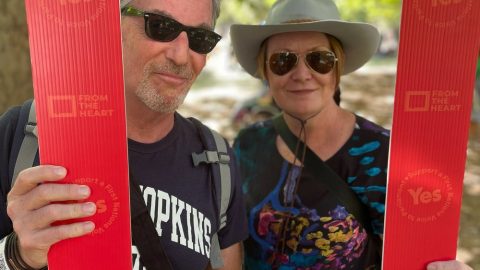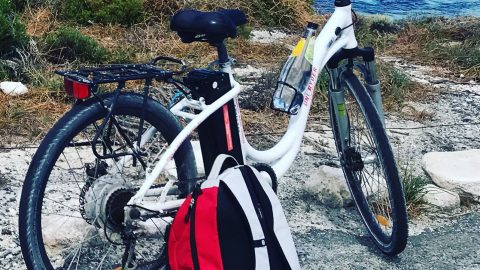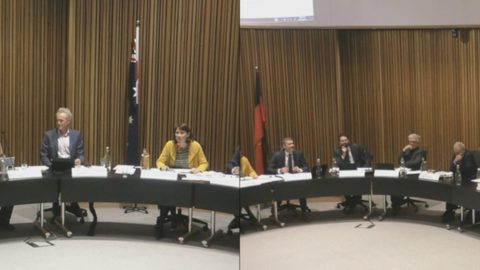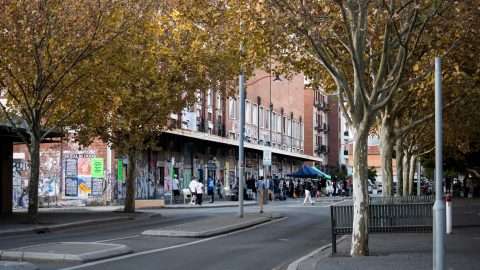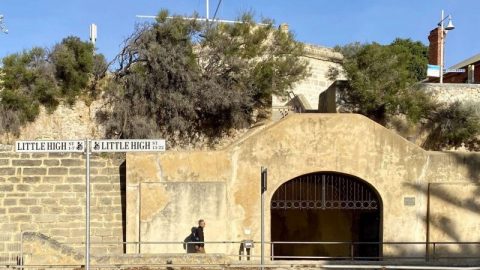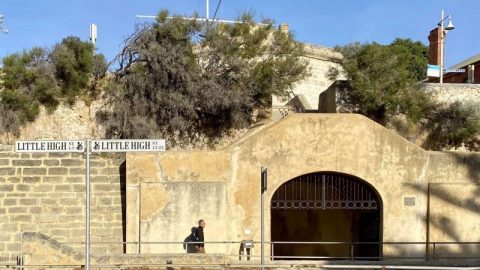In winter, the southerlies whip straight up the street and through our coats. In summer, the sun beats down directly into our eyes, until it gets below the gable of the old Freo Tech across the road. Many of the regulars are arthritic or elderly, but most still insist on standing. After all, the refugees living here now without rights, and those in offshore detention, have few choices about personal comfort.

It’s a Friday evening routine in Freo. Between 5 and 6 pm, an eclectic group of individuals stand on the corner of Parry St and South Terrace in the heart of the town, with tatty placards calling for a more humane Australia. 14 June marked an unbroken record of 200 Friday vigils.
The traffic stops at that intersection for long enough for people to read our signs or wind down their windows to talk. Passersby acknowledge us, and our cause. Cyclists ring their bells, blow kisses or give the thumbs up and drivers honk. Some evenings there is so much horn blowing that we could be in Rome or Mumbai.
As people walk to Friday drinks or a night in town with family and friends, some pause to ask what all the fuss is about. A chat for a few minutes is all it takes to get most people on-board, as they learn the truth about our country’s policy for those seeking asylum.
Others, who have suffered by this policy, also occasionally stop. Most often they express solidarity with a gesture; hand on the chest or hands grasped. Last week, a young man dressed in high viz gear, perhaps from Somalia or Ethiopia, looked at us for a long moment and said simply: ‘Thank you, thank you’.
Some walk by with eyes to the ground. Rarely, someone shouts obscenities and racial slurs, usually from the safety of a revving car.
Newcomers to the vigil are greeted with warmth and a poster to hold. It’s the most accepting of groups. If you care about a humane policy for refugees, you’re welcomed into the fold.
There’s a lot of laughter and warmth in this group. Even as we update each other on the state of a refugee friend visited in the detention center at Yongah, or the saga of another refugee family in Perth struggling to put food on the table or find a rental to live in, there is humour to make it all bearable.
Since 2001, Australia has placed the policing of our borders ahead of the rights of asylum seekers and refugees. Despite being party to the 1951 Convention relating to the Status of Refugees and its 1967 Protocol, successive governments have continued to treat many asylum seekers cruelly. The horror of Tampa in 2001 is still with us. We looked on in shame when the Australian government ignored its international humanitarian obligations and turned its back on those Hazara refugees. We were mortified to find that our government had boarded the vessel with troops instead of medical assistance. So began the “Pacific Solution” of offshore detention and decades of darkness for refugees seeking asylum in Australia.
Since that time we have sent people into offshore detention for years, where conditions lead to physical and mental illness. We have left people in the community for more than a decade, in limbo, some with no work rights, no Medicare and no benefits, while the Department of Home Affairs applies the ironically named “fast track” process to determine their visa status. We have detained others for years in on-shore prison-like centres. We have coerced some to return to places where they would face persecution or death.
These last few months the debate about a small number of asylum seekers who have committed crimes has dominated the media and sadly whipped up fear and racism. This focus can so easily lead to the vilification of thousands of law-abiding decent people who come here seeking refuge from war and persecution. The proposed (anti-refugee) Migration Amendment (Removal and Other Measures) Bill will give the Minister far reaching powers, including the ability to jail persons who will not cooperate by returning to a country where death may await them. Those of us with refugee friends or neighbours look on with deep sadness.
In our times of frenzied social media, when revolutions are set in motion on X/formerly Twitter, why is this street corner protest still so effective? Because our physical presence shows a commitment. Because we can’t be scrolled away. Because we make ourselves vulnerable in this most public of places to show that we care and to ask others to care.
The actual gathering of real people also works because it supports us to keep up our efforts for this cause, emailing and phoning politicians, talking to refugees on-line or visiting them, collecting and sorting donations for the basic needs of those living in our community while they wait interminably for a status that gives them the right to work, educate their children and contribute to this country.
Standing together on that street corner in the burning sun or the chilling wind gives us hope. It’s the hope that when ordinary Australians pause to consider, they will care, and that in the midst of all this darkness, change is still possible.
In short, the Justice Vigil for Refugees works because we show ourselves as human, asking for more humanity for those who have been treated so inhumanely.
And now the Justice Vigil is 200 Fridays old.
By Pauline Pannell, Grandmothers for Refugees Fremantle
~~~~~~~~~~~~~~~~~~~~~~~~~~~~~~~~~~~~
* If you’d like to COMMENT on this or any of our stories, don’t hesitate to email our Editor.
** WHILE YOU’RE HERE –
PLEASE HELP US TO GROW FREMANTLE SHIPPING NEWS
FSN is a reader-supported, volunteer-assisted online magazine all about Fremantle. Thanks for helping to keep FSN keeping on!
*** And don’t forget to SUBSCRIBE to receive your free copy of The Weekly Edition of the Shipping News each Friday!
****AND Shipees, here’s how to ORDER YOUR FSN MERCH. Fabulous Tees with great options now available!
